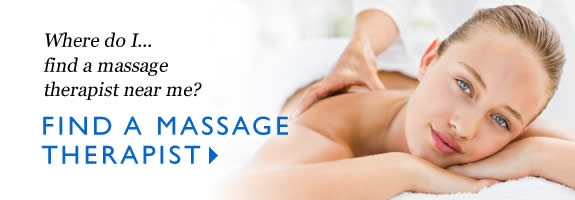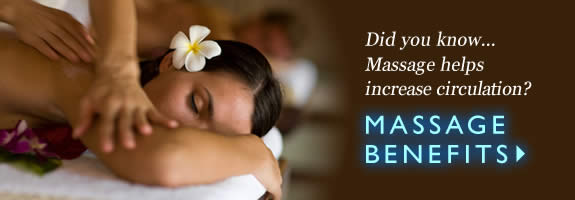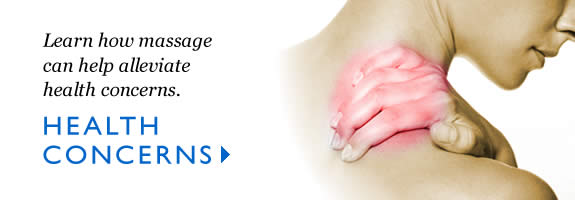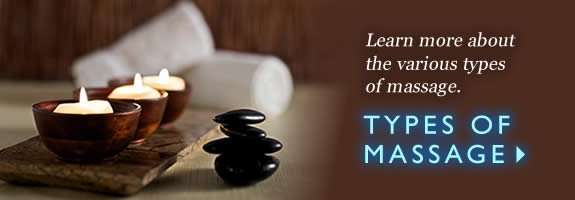Massage Benefits
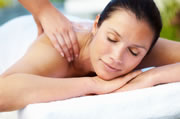
Some people think the only benefit of getting a massage is for reduction of stress and anxiety. While it is true that massage does help you relax, it is only one of the many benefits of therapeutic massage.
-
Alleviates Chronic Pain
Massage helps to relax tense muscles, improve blood flow and remove toxins from the body, which all contribute to chronic pain. Massage also triggers the body’s release of endorphins, the body’s natural painkiller.
-
Improves Range of Motion
Through the use of both massage and passive stretching techniques, joints become more flexible thus improving overall range of motion in previously stiff joints.
-
Reduces the Use of Medication
Studies have shown that clients use less pain medication and medications to reduce stress if they get regularly scheduled massages.
-
Enhances the Immune System
Light stroke massage helps to stimulate the lymphatic system, which acts as the body’s natural defense against environmental toxins, viruses and bacteria.
-
Enhances Quality of Sleep
Gentle massage activates the parasympathetic part of the nervous system, responsible for relaxing the body. Some studies have shown massage may also affect the production and release of melatonin, a natural hormone that encourages sleep.
-
Improves Concentration and Focus
By helping your mind and body to relax, massage can reduce the mental noise that is often so distracting. Massage also improves the balance of hormones such as serotonin, which can improve focus.
-
Reduces Fatigue
Massage reduces fatigue in a couple of ways. By encouraging the body to go into a deeper, more relaxed sleep you are able to recuperate faster from a tiring day. Massage itself can also invigorate and energize you if the strokes used are firmer and faster than a gentle Swedish technique. These techniques are often used in sports massage to help athletes prepare before an event.
-
Lowers Blood Pressure
Gentle massage helps to decrease levels of stress and anxiety, which can be underlying causes of hypertension (high blood pressure). It reduces the production of cortisol, a hormone present in high stress situations.
-
Reduces Scars and Stretch Marks
Massage helps with tissue regeneration, which in turn helps to reduce the production of scar tissue and the stress on the skin that causes stretch marks.
-
Reduces Edema and Swelling After Injury or Surgery
Lymphatic drainage massage is especially helpful in reducing and even eliminating the buildup of fluid.
-
Eases Depression and Lessens Anxiety
Massage contributes to a sense of well-being, in part because it encourages the body to release “feel-good” hormones like serotonin and oxytocin.
-
Reduces Cramps and Spasms
Massage helps to relax muscles that may be overworked in sporting events or in spasm because of neuromuscular disorders.
-
Improves the Tone of Weak or Atrophied Muscles
Massage helps to improve the flow of blood and oxygen bringing nutrients to the underused muscles, while stretching will give the muscles some increased movement.
-
Improves the Condition of the Skin
Through the use of nourishing lubricants as well as the movements of the massage therapist’s hands along the body, the skin benefits from the increased blood flow and lymph circulation. The skin is the body’s largest organ and the one most exposed to harmful external influences. It is important to keep the skin healthy and strong.
-
Improves Proprioception
Proprioception is the sense of where our body is in space and time. Lack of healthy touch can impair this sense, but massage can restore it and make you less clumsy and more surefooted.
-
Improves Body Image
Studies have shown that people who get regular massages have more positive feelings with regard to body image than those who do not get massages.
